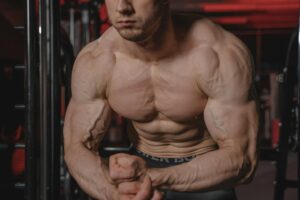Building muscle mass requires a combination of consistent strength training and proper nutrition. While there are a variety of foods that can support muscle growth, some are particularly effective due to their high protein content, essential amino acids, and other key nutrients. Lean meats, eggs, Greek yogurt, cottage cheese, quinoa, brown rice, and spinach are just a few examples of foods that are known for their muscle-building properties. We choose The Right Foods for Exercise. By incorporating these foods into your diet, along with a balanced mix of other nutrient-rich foods, you can fuel your workouts, support muscle growth and repair, and achieve your fitness goals. Also, Personal trainer can achieve your fitness goals. In this article, we’ll take a closer look at the top 7 foods you need to build muscle mass, and explore why these foods are so beneficial for muscle growth and overall health.
The Top 7 Foods for Muscle Gain
Lean meats
Lean meats such as chicken, turkey, and lean cuts of beef are excellent sources of protein, which is essential for building and repairing muscle tissue. Lean meats are an excellent source of protein, which is essential for building and repairing muscle tissue. Chicken, turkey, and lean cuts of beef are particularly good options, as they are low in fat and high in protein.
Protein is made up of amino acids, which are the building blocks of muscle tissue. When you exercise, you create tiny tears in your muscle fibers. Protein helps to repair these tears, and also provides the necessary nutrients to help your muscles grow and get stronger.
Eggs
Eggs are a great source of protein, as well as other nutrients like vitamin D and choline, which are important for muscle function and overall health. Eggs are one of the most nutrient-dense foods you can eat, and they are a great source of protein, as well as other nutrients like vitamin D and choline, which are important for muscle function and overall health.
A large egg contains approximately 6 grams of protein, which is essential for building and repairing muscle tissue. Protein also helps to keep you feeling full and satisfied, which can be helpful for weight management and maintaining a healthy body composition.
In addition to protein, eggs are also a good source of vitamin D. This vitamin plays a critical role in bone health, as well as immune function and muscle function. Many people are deficient in vitamin D, and incorporating eggs into your diet can be a great way to increase your intake.
Greek yogurt
Greek yogurt is a high-protein, low-fat dairy product that is also rich in calcium, which is important for bone health. Greek yogurt is a popular dairy product that is known for its high protein content and creamy texture. Compared to regular yogurt, Greek yogurt is strained to remove the liquid whey, which results in a thicker, more concentrated product.
Greek yogurt is a great source of protein, with a 6-ounce serving containing approximately 17 grams of protein. This makes it an excellent food choice for anyone looking to build muscle mass or maintain a healthy weight. Protein is also important for satiety, which means that it can help to keep you feeling full and satisfied throughout the day.
In addition to protein, Greek yogurt is also a good source of calcium, which is important for bone health. Calcium is essential for building strong bones and teeth, and it also plays a role in muscle function and nerve transmission.
Cottage cheese
Cottage cheese is another high-protein dairy product that also contains casein, a slow-digesting protein that can help keep you feeling full for longer periods of time. Cottage cheese is a type of cheese that is made from the curds of cow’s milk. It has a creamy texture and a mild, slightly tangy flavor. Cottage cheese is a great source of protein, with a half-cup serving containing approximately 14 grams of protein.
One of the unique benefits of cottage cheese is that it also contains casein, a slow-digesting protein that can help keep you feeling full for longer periods of time. This can be helpful for anyone looking to maintain a healthy weight or avoid overeating.
In addition to protein and casein, cottage cheese is also a good source of calcium, which is important for bone health. Calcium is essential for building and maintaining strong bones and teeth, and it also plays a role in muscle function and nerve transmission.
Quinoa
Quinoa is a gluten-free, high-protein grain that also contains essential amino acids, which are important for muscle growth. Quinoa is a popular grain that is native to South America. It has gained popularity in recent years due to its many health benefits and versatility in the kitchen. Quinoa is a gluten-free, high-protein grain that is also rich in essential amino acids, making it a great food choice for anyone looking to build muscle mass or improve their overall health.
One of the unique benefits of quinoa is its high protein content. A one-cup serving of cooked quinoa contains approximately 8 grams of protein. This makes it a great food choice for vegetarians and vegans, who may have difficulty getting enough protein from plant-based sources.
Quinoa is also a good source of essential amino acids, which are important for muscle growth and repair. Essential amino acids are those that the body cannot produce on its own, and therefore must be obtained through the diet. Quinoa is one of the few plant-based sources of all nine essential amino acids, making it a complete protein source.
Brown rice
Brown rice is a complex carbohydrate that provides a slow and steady release of energy, which can help fuel your workouts and support muscle growth. Brown rice is a whole grain that is a staple in many cultures around the world. Unlike white rice, which is stripped of its bran and germ during processing, brown rice retains these nutritious components. This makes it a great food choice for anyone looking to build muscle mass or improve their overall health.
One of the unique benefits of brown rice is its complex carbohydrate content. Complex carbohydrates are broken down slowly in the body, providing a steady and sustained release of energy. This can be helpful for fueling workouts and supporting muscle growth. Additionally, complex carbohydrates can help to regulate blood sugar levels and promote feelings of fullness and satisfaction.
Brown rice is also a good source of fiber, with a one-cup serving containing approximately 3.5 grams of fiber. Fiber is important for digestive health and can also help to reduce the risk of chronic diseases such as heart disease, diabetes, and certain types of cancer.
In addition to complex carbohydrates and fiber, brown rice is also a good source of several vitamins and minerals, including manganese, magnesium, and phosphorus. These nutrients are important for bone health, muscle function, and overall health.
Spinach
Spinach is a nutrient-dense leafy green that is rich in vitamins and minerals, including iron and magnesium, which are important for muscle function. Spinach is a nutrient-dense leafy green that is packed with vitamins, minerals, and other essential nutrients that are vital for maintaining good health. Spinach is an excellent source of iron, magnesium, and other key nutrients that are important for muscle function and overall health.
Iron is an essential mineral that is required for the production of red blood cells, which carry oxygen to the muscles. This oxygen is essential for muscle function and can help to improve endurance during workouts. Spinach is an excellent source of iron, with one cup of cooked spinach providing approximately 6% of the daily recommended intake of iron.
Magnesium is another important mineral that is found in spinach. Magnesium is essential for muscle function, and can help to improve muscle strength and endurance. Spinach is a good source of magnesium, with one cup of cooked spinach providing approximately 39% of the daily recommended intake of magnesium.
Conclusion
Incorporating these 7 foods into your diet can help you fuel your body with the nutrients it needs to build muscle mass. It’s important to remember that while diet is a critical component of muscle growth, it should be combined with regular exercise and rest for optimal results.






